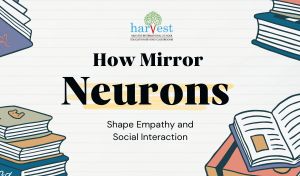How Mirror Neurons Shape Empathy and Social Interaction
Empathy and social interaction are fundamental aspects of human relationships, enabling individuals to connect, communicate, and build meaningful bonds. At Harvest International School, one of the best schools in Sarjapur Road Bangalore, we emphasize the importance of understanding the scientific basis of social behaviour. A key factor influencing these interactions is the role of mirror neurons—specialized brain cells that allow us to understand and share the emotions of others.
Understanding Mirror Neurons
Mirror neurons were first discovered in the 1990s by neuroscientists studying macaque monkeys. These neurons fire not only when an individual performs an action but also when they observe someone else performing the same action. This mirroring mechanism allows humans to simulate and understand others’ feelings, making mirror neurons crucial for empathy and social bonding.
At Harvest International School, among the best schools in Bangalore India, we incorporate neuroscience-based learning strategies to help students develop emotional intelligence and social awareness.
The Role of Mirror Neurons in Empathy
Empathy is the ability to understand and share the feelings of others. Mirror neurons facilitate this process by enabling individuals to experience emotions vicariously. When students witness a peer in distress, their mirror neurons activate, allowing them to feel a similar emotion and respond with compassion.
As one of the CBSE schools in Bangalore Sarjapur Road, we encourage activities that strengthen empathy among students, such as role-playing, storytelling, and collaborative projects. By fostering emotional connections, we help students develop strong interpersonal skills that prepare them for the future.
Mirror Neurons and Social Interaction
Social interactions are deeply rooted in non-verbal communication, including facial expressions, gestures, and body language. Mirror neurons enable individuals to interpret these signals effectively. This neurological process plays a crucial role in understanding social cues, forming friendships, and developing teamwork skills.
At Harvest International School, ranked among the top schools in Bangalore, we integrate social learning techniques into our curriculum, ensuring that students excel not only in academics but also in interpersonal relationships. Activities such as group discussions, peer mentoring, and community engagement initiatives enhance students’ ability to connect with others.
How Harvest International School Encourages Empathy and Social Learning
1. Interactive Learning Environments
Creating a nurturing and interactive learning space is essential for developing empathy. Our classrooms are designed to promote open discussions and collaborative problem-solving. This approach aligns with our commitment to being one of the best schools in Sarjapur Road Bangalore, where holistic education is a priority.
2. Role of Educators in Enhancing Emotional Intelligence
Teachers play a significant role in modelling empathetic behaviour. At Harvest International School, one of the best schools in Bangalore India, our educators undergo training programs that emphasize emotional intelligence and active listening. By demonstrating kindness and understanding, teachers inspire students to develop these traits in their daily interactions.
3. Encouraging Teamwork and Collaboration
Group projects and extracurricular activities provide students with opportunities to practice empathy and teamwork. As a leading CBSE school in Bangalore Sarjapur Road, we offer various programs that encourage students to work together towards common goals, enhancing their ability to understand different perspectives.
4. Fostering Emotional Resilience
Understanding emotions and responding constructively to challenges are essential life skills. Our school integrates mindfulness and emotional regulation techniques into daily learning experiences. This focus on emotional well-being reinforces our standing as one of the top schools in Bangalore.
The Connection Between Mirror Neurons and Altruism
Altruistic behaviour—helping others without expecting anything in return—is closely linked to mirror neuron activity. When students witness acts of kindness, their mirror neurons activate, inspiring them to engage in similar behaviours.
At Harvest International School, we instil a sense of responsibility and compassion through community service initiatives, ensuring that our students grow into thoughtful and considerate individuals.
Integrating Neuroscience with Education
As one of the best CBSE schools in Bangalore, we recognize the importance of integrating scientific knowledge into our teaching methodologies. Understanding the role of mirror neurons allows educators to tailor instructional strategies that enhance student engagement and emotional learning.
Future Directions in Social and Emotional Learning
With advancements in neuroscience, educators can further refine teaching techniques to support social and emotional development. Our vision at Harvest International School, one of the CBSE schools in Bangalore Sarjapur Road, is to continue implementing innovative approaches that prepare students for a socially dynamic world.
Conclusion
Empathy and social interaction are essential for personal and professional success. By understanding the role of mirror neurons, students can enhance their ability to connect with others, fostering a culture of kindness and cooperation. At Harvest International School, one of the best schools in Sarjapur Road Bangalore, we remain committed to nurturing these vital skills, ensuring that our students thrive in all aspects of life.
Through structured programs and an emphasis on emotional intelligence, we empower our students to become compassionate leaders and active contributors to society. As one of the best schools in Bangalore India, our approach to education goes beyond academics, focusing on holistic growth and lifelong learning.





